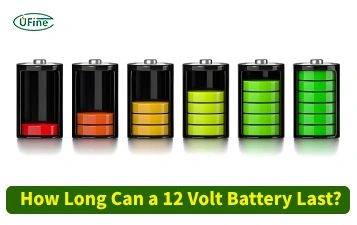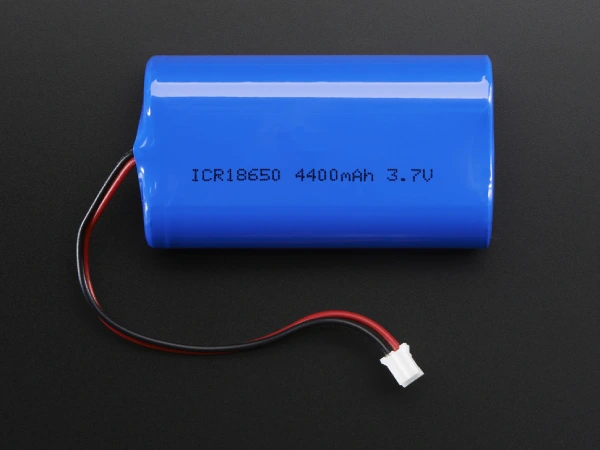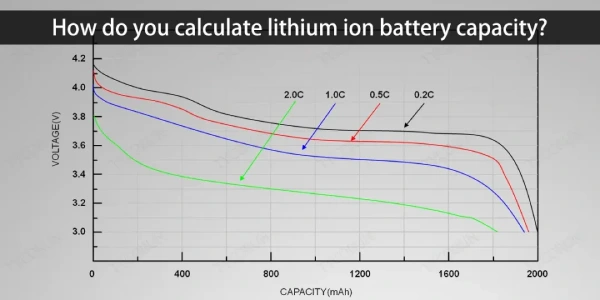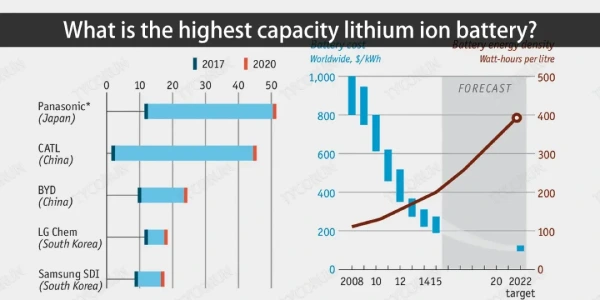Here we will introduce li-ion battery capacity, how to calculate it, battery capacity fade, high capacity batteries, and everything about li-ion battery capacity. Let’s start!
Part 1. What is the li-ion battery capacity ?
Lit-ion battery capacity is the maximum energy a lithium battery can store and discharge into current under specific conditions. Lithium-ion battery capacity is typically expressed or measured in ampere-hours (Ah) or milliampere-hours (mAh). Manufacturing technology and chemical composition are the most important factors affecting lithium-ion battery capacity.
In addition, the size and mass of a lithium-ion battery, as well as its charge and depth of discharge, play a crucial role in determining the li-ion battery capacity .
In addition to charge and discharge rates, environmental and battery temperatures can significantly shorten or increase the life and li-ion battery capacity .
Part 2. What is li-ion battery capacity fade?
Over time, lit-ion battery capacity may decrease or increase. Internal resistance, chemical degradation, and physical damage can all cause battery capacity to decrease over time, a phenomenon known as capacity fade. The rate of capacity loss is affected by how the battery is used and maintained.
Part 3. How to calculate li-ion battery capacity?
When technical li-ion battery capacity, you need to know the current and time to calculate li-ion battery capacity. Current, usually measured in amperes (A) or milliamperes (mA), is the amount of charge flowing through the battery per unit time.
Time, usually measured in hours (h) or fractions of an hour, is the duration of a charge or discharge cycle.
The calculation formula for lithium-ion battery capacity is:
Capacity (Ah) = current (A) × time (h)
If your lithium-ion battery can deliver 2 A for 3 hours, you can calculate its capacity as:
Capacity (Ah) = 2 A x 3 h = 6 Ah
This indicates that the battery has a storage capacity of 6 amp hours and an output of 6 amps.
This method is a rough estimate. Because it does not take into account variables such as temperature, battery status, depth of discharge, charge and discharge rate, and battery life. All of these factors may affect battery capacity. Therefore, the actual battery capacity may be lower than the estimated figure.
Part 4. What is the highest capacity li-ion battery?
As our electricity demand continues to grow, so does the capacity of batteries, especially in energy storage. Currently, the capacity of most energy storage batteries can reach 280Ah. While the current highest capacity li-ion batteries varies by manufacturer, advances in battery technology are critical in the energy storage space.
As renewable energy sources such as wind and solar are increasingly used to generate electricity, energy storage batteries are key to storing and delivering power when needed, making them an important part of the energy system. Continuing to invest in developing more advanced battery technology will ensure reliable and safe energy and help us transition to a more sustainable future.
Part 5. What is the high capacity battery?
High capacity battery is a popular name for some battery packs with relatively high capacity. There is no specific agreement on how high the voltage and capacity are and above is high capacity battery.
Advantages of high capacity lithium battery
Here we take high capacity lithium battery as an example to see the advantages of high capacity battery.
- High capacity lithium battery has relatively high energy. It has high storage energy density. The energy ratio of some high-capacity batteries has reached 460-600Wh/kg, which is about 6-7 times that of lead-acid batteries.
- High capacity lithium battery has a long service life, reaching more than six years. A battery with lithium iron phosphate as the positive electrode can be charged and discharged at 1C (100% DOD) and has a record of being used 10,000 times.
- The high capacity lithium battery has a high rated voltage (single operating voltage is 3.7V or 3.2V), which is approximately equal to the series voltage of three nickel-cadmium or nickel-metal hydride rechargeable batteries, making it easy to form a battery power pack.
- High capacity lithium battery has high power endurance. Among them, the lithium iron phosphate lithium-ion battery used in electric vehicles can reach a charge and discharge capacity of 15-30C, facilitating high-intensity starting and acceleration.
- The self-discharge rate of high capacity lithium batteries is very low. This is one of the most outstanding advantages of this battery. The self-discharge rate of high-capacity lithium batteries can generally be less than 1%/month, which is less than 1/20 of that of nickel-metal hydride batteries.
- High capacity lithium battery is light and weighs about 1/6-1/5 of lead-acid products in the same volume.
- The high capacity lithium battery’s self-discharge rate strongly adapts to high and low temperatures. It can be used in environments ranging from -20°C to 60°C. For example, Ufine Battery’s low-temperature lithium battery can be used at -45°C.
Part 6. Common li-ion battery capacity and applications
| Li-ion Battery Capacity | 애플리케이션 |
|---|---|
| 14000 mAh | Electric bicycles, scooters, drones, etc. |
| 5000 mAh | Flashlight, remote control device, power wheel |
| 3000 mAh | Camera, power tools, photography lighting |
| 2500 mAh | Flashlights, toys |
Each battery listed above has its unique features and applications. Before purchasing a battery, consider factors such as voltage, capacity, and compatibility with your device.
Part 7. Can the li-ion battery capacity be increased?
The capacity of lithium-ion batteries can be increased by optimizing the battery’s design, chemistry, and production process.
How to increase lithium-ion battery capacity? We’ve listed four methods below:
1. Increase electrode surface area
Enlarging the contact area between active ingredients and electrolytes can increase lithium battery capacity. The number of electrochemical reactions a battery can perform by increasing the electrode surface area is directly related to the amount of charge that can be stored and delivered in the battery.
2. Use materials with higher energy density
Energy density measures how much energy, weight, or space a battery can hold. Using materials with higher energy density can increase the power savings a battery of a certain size and weight can achieve. Some elements with high energy density are silicon, sulfur, and lithium metal.
3. Enhance electrolyte performance
The electrolyte is the conduit that transports ions between the electrodes. Improving the efficiency of the electrolyte can improve the conductivity, stability, and safety of the battery. Options such as additives, solid or gel electrolytes, or ionic liquids can improve electrolyte performance.
Part 8. Is the larger the capacity of the li-ion battery, the better?
Whether the capacity of a lithium battery is larger or better depends on the specific application scenarios and needs.
1. Capacity and usage time
Under ideal circumstances, regardless of the size and weight of lithium batteries, the larger the capacity of the lithium battery, the longer the battery life.
2. Capacity and stability
Although higher-capacity cells may appear more advantageous upon initial use, they may sacrifice electrode stability by using more capacity-increasing substances. This can cause the battery to rapidly degrade after a few charge cycles.
3. Energy density
Under the condition that the volume remains unchanged, the energy density of lithium batteries is directly proportional to the capacity. This means increasing energy density is key to increasing battery capacity. However, the energy density increase of lithium batteries is limited by technologies such as cathode materials, so it is difficult to achieve a breakthrough capacity increase simply by relying on existing materials.
4. Other factors
Battery type (such as lithium and nickel metal hydride), energy density, discharge rate, and fast charging protocols are all important factors that affect battery performance.
Part 9. Final Thoughts
To sum up, the li ion battery capacity is not the only factor that determines battery performance. Factors such as capacity, stability, energy density, discharge speed, battery type, fast charging protocol, and environmental protection should be comprehensively considered when selecting a battery. Therefore, we cannot simply say that the larger the lithium battery capacity, the better. However, we should make the appropriate choice based on specific needs and applications.
관련 태그:
더 많은 기사

12 Volt Batteries: How Long Can They Really Last?
Discover how long a 12-volt battery lasts, factors affecting its lifespan, and tips to extend its life.
Upgrade Your Drill Battery to Lithium Batteries
Discover why switching from Ni-Cd to li batteries for your drill is essential. Learn about battery types, comparisons, and how to choose the best drill battery.
Everything You Need to Know About Group 26 Batteries
Discover the ins and outs of Group 26 batteries, including types, dimensions, prices, and maintenance tips. Learn where to buy the best Group 26 battery.
Recommended 10 Leisure Batteries for Motorhomes or Caravans
Traveling in a motorhome or caravan? A good leisure battery is essential. Avoid power issues with our guide to the top 10 best leisure batteries for this year.
Top 10 Truck Battery Options to Keep You Rolling Strong
Struggling with weak truck batteries? Avoid breakdowns with our guide to the top 10 truck batteries, ensuring durability and high performance for any journey.






